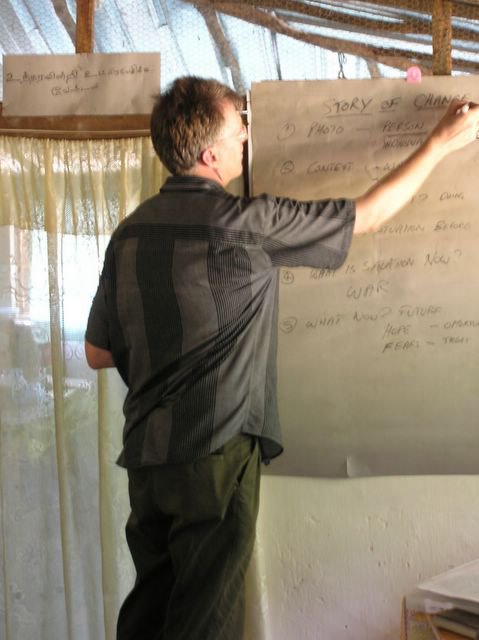 Vincent is now 48 years, has 1 child a 13 years old daughter and is Buddhist. He is seen hearing chatting to Sr Christine Fernando. Vincent is one of the three full time staff of the Human Rghts Centre in Ekala.
Vincent is now 48 years, has 1 child a 13 years old daughter and is Buddhist. He is seen hearing chatting to Sr Christine Fernando. Vincent is one of the three full time staff of the Human Rghts Centre in Ekala. "Today I was working to get two boys 18 & 19 yrs released from Police custody. They have been charged with theft and arrested on 28th January. Both boys had been assaulted continually for 4 days whilst in police custody. The mothers came to this centre after visiting the police station “With me another 72 workers lost their jobs so we have a lot of rights to win back so I have to do it for myself and my fellow workers also’
'I have an experience working on conditions in my own factory and so that experience helps me assist workers fromother factories. It is my intention to minimise the possibilities employers have of victimising their workers. ' Vincent then describes some of the problems workers face:
'At this moment all our labour laws are, in effect, inactive and we want to activate such laws. Our big obstacle is the lethargy of the officials in the labour department of government'.
'Police are also a major problem, they are largely inactive in matters of labour laws. We have had a case against my old employer for the last 3 years demanding back pay and severance gratuity – even the court has ordered this – but no one implements it.'
There is even a warrant out for the arrest of the owner for non-appearance in court to answer the charges but he doesn’t come and he isn’t arrested. Members of Parliament and even Ministers send courteous acknowledgement to our letters of complaint but do nothing. Is it a surprise that workers feel they have to take the law into their own hands?’
Fr Sarath Iddamagoda, one of the founders of the Human Rights Centre, says 'A new issue emerging now is homelessness. A man recently came here to say that his wife and gone to work overseas in middle east. After 6 months he has received no information from her and he was looking after the children so couldn’t work but had heard nothing from his wife. He came to the Centre to get advice and help. It emerged during the conversation that he was living in a rented room and with no work and no income as his wife had stopped remitting monies to him we found that there was a critical home issue. From that visit many other issues of housing rights and threatened homeless ness have come to light. We are now having meetings with many small young families where their homes are at threat – we want to get them organised.'
Fr Sarath describe how they acted in this case. 'We wrote to the Foreign Workers bureau and through the agency that hired the overseas worker and then through SEDEC approached the Lebanon migrants workers centre. where we discovered she had been 'employed'. The women finally came back to Sri Lanka last week. She said that the first private house that had employed her as a domestic servant had never paid her and she finally had to run away. The agency that had recruited her tried to get her to return because they had taken payment ‘contract’. She was punished and abused physically and had a terrible time. When she made a police complaint she was detained because she had no paper but she said 'that was the best treatment I ever had in the Lebanon', although she was taken to the plane in handcuffs. The family is now re-united but now the husband is jobless.
The Centre is situated in a small family one-floor bungalow just off the main road through Ekala, a large estate of factories. The traffic noise is the constant backdrop to our conversation. While we were sitting talking about the work of the Centre a young man came from NISOL, a local factory, with a complaint from a friend working with Expo Lanka.
'Now 4th Feb is a national holiday for Independence Day but Expo Lanka have declared it a normal working day. What can we do about this?’ the young man asks. ‘In our factory we are given the choice to come to work on 4th and to then earn overtime’. Expo Lanka produces card board packaging and work all days to meet the demand for orders. They have no union and this makes it easier for the Management to ignore labour laws. Vincent asked the young man to ask his friend to call him so he could get the full facts before deciding what could be done
'We have good labour laws here in Sri Lanka but they so often ignored or no applied' says Fr Sarath.


No comments:
Post a Comment